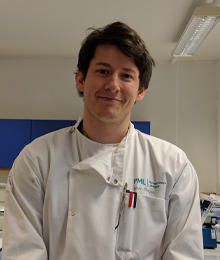An interview with Kevin Purves
February 2020
Kevin Purves is a PhD student at the Plymouth Marine Laboratory. He is a member of the Microbiology Society and in this interview he tells us more about his research on the role viruses and microbes play in the marine environment and their impact on biogeochemical cycles.

Tell us a little about your area of research.
I am technically still a PhD student, but submitted my thesis in October 2019 and I am currently preparing for my viva. My project involved investigating the potential role that viruses play on methanol in the ocean, by specifically investigating methanol-utilising bacteria, known as methylotrophs. This is a massively understudied area and contributes to the understanding of the role that viruses play in the marine environment and on the constantly expanding subject of carbon cycling.
Why is this research important?
I also explored the diversity and distribution of the xoxF5 gene, which has recently been associated with microbial methanol utilisation, and along with recent high-profile studies into the dominant SAR11 clade, could indicate that methylotrophy is far more prevalent in the oceans than originally anticipated. It is therefore interesting to investigate the interplay between viruses and these bacterial hosts, as these interactions account for a significant portion of cell mortality, but also interact with bacteria in other manners.
Why does microbiology matter?
Many of the greatest problems we face are being answered with microbiology, such as using viruses or novel secondary metabolites to fight the ever-increasing problem of antibiotic-resistant bacteria. Much work has indicated the impact that microbiology has on the environment and the fact that many biogeochemical cycles are driven by microbes and viruses. Furthermore, many believe that the search for extra-terrestrial life has already made significant strides forward by looking at the extremophilic micro-organisms that exist in the most extreme environments on Earth.


